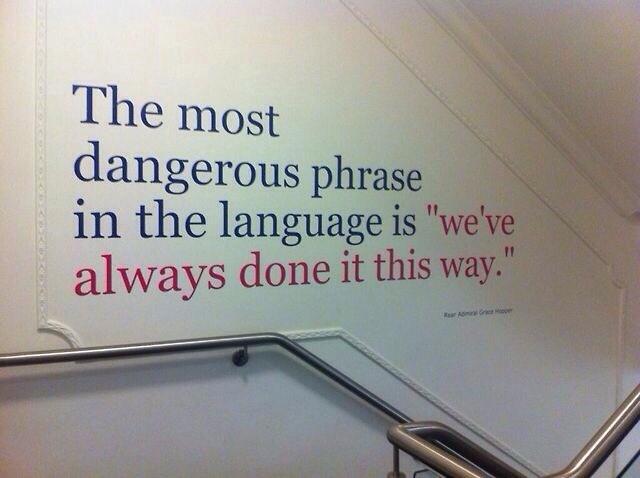


by Terry Heick
I was speaking (tweeting) with Mark Barnes tonight, and he mentioned the idea of challenging existing forms and practices. And then someone tweeted the above image–a quote attributed to Rear Admiral Grace Hopper, according to the image source globalnerdy.com–and I was happy and favorited and saved and blogged.
“We’ve always done it this way” implies legacy and tradition, which can be good. But it’s also one of the most dangerous phrases we can use—and this danger extends to education, as well.
I talk a lot about disruptive teaching and paradigm shifting in teaching and learning not because I’m inherently rebellious, or some kind of academic anarchist. I’ve just taught long enough–in a wide variety of places–to realize that this idea of progress–and slow iteration–through data and sharing and ‘opening our classroom door’ just isn’t sufficient.
It’s not bad, it just doesn’t reflect the priority and urgency of our collective challenge. At best, students come to school to play the game and be thought of as smart and successful; at worst, they come to disrupt and resist and simply make it through the year because they see no value in what they do.
We have to create laws to force students to come to school, and it’s often the students that need school the worst who aren’t ‘made’ for it; that is, school is made for students who are strong readers and writers that can manage their work while learning to play nicely with others.
Changing lives usually comes from relationships with teachers rather than the power of curriculum. But talking about mobile learning, self-directed learning, new content areas, adaptive learning, or valuing questions over answers can kill conversations in school and elicit polite smiles from teachers, mainly because those aren’t the rules of the game they know.
The problem with the safe approach to teaching is that it won’t yield anything other than what we’ve always had. Without doing things radically different, the most we can hope for is some kind of increment. This isn’t a plea for chaos, but rather the courage to make mistakes.
The phrase, ‘We’ve always done it this way’ symbolizes stagnant thinking and a resistance to innovation, reflecting an unwillingness to question established methods or consider new ideas. This mindset often stifles creativity, limits progress, and prevents growth by clinging to outdated practices simply because they are familiar.
It can also create an environment where change is seen as a threat rather than an opportunity for improvement, discouraging individuals from challenging the status quo or exploring alternative solutions. Over time, this rigid adherence to tradition can lead to missed opportunities, decreased efficiency, and a lack of adaptability in a rapidly evolving world. To foster innovation and continuous improvement, it’s crucial to replace this mindset with one that values flexibility, embraces change, and encourages forward-thinking approaches.
To ‘experiment’ on students (because that’s what’s already happening anyway). Dream, try, and collect data.
Do something different this year.
Don’t necessarily–and mindlessly–do what you’re told.
Light up a new pathway.
Creatively, professionally, and persistently agitate your department, grade level, school, or district to not just become the best version of their existing selves, but become something else that they didn’t think was possible.
The same hope you have for your students.
The Most Dangerous Phrase In Education